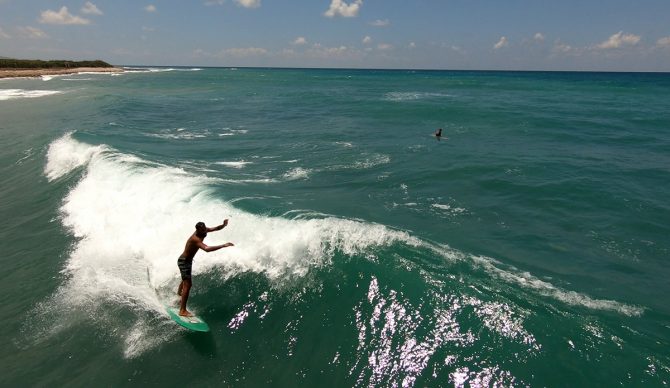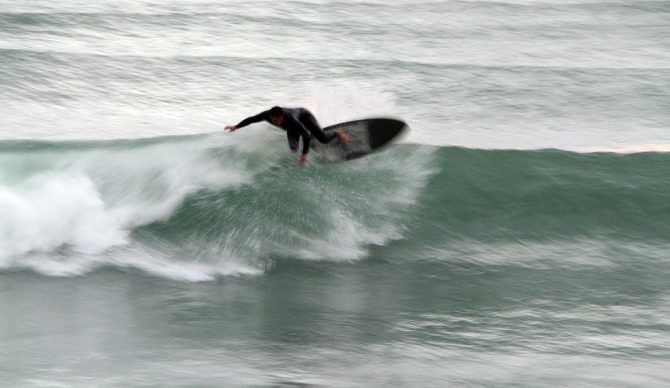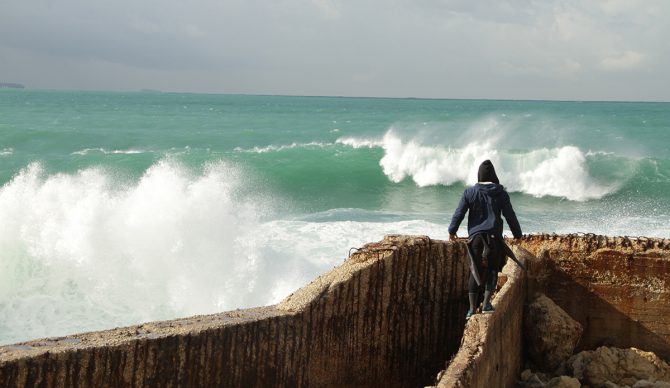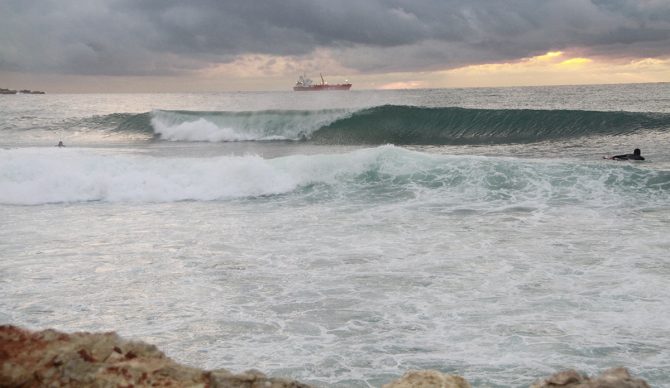
Yes, there are waves in Lebanon. Photos: Courtesy Ali Elamine
As bombs and bullets rained over Beirut, surfing was the least of anyone’s worries. Lebanon’s prolonged civil war in the ’70s and ’80s turned the country upside down and caused nearly a million Lebanese to look for refuge abroad.
Surfing, which is believed to have been introduced to the country in the ’60s, disappeared.
However, in recent years the pursuit has been reborn. A Lebanese-American man, Ali Zeid Elamine, has returned to his home country to carry the torch and create a flourishing community of Lebanese surfers.
After growing up in the surf-infused community of Huntington Beach, Ali returned to Lebanon in 2011 with his Californian love for riding waves. In the empty waves of the Mediterranean, he saw a future for the sport that could improve the lives of the Lebanese people.
It’s been 13 years since his return to Lebanon. And the seeds he has nourished are already having an impact. I saw it myself first hand.
On my second day in Lebanon, I got a message from Ali, “It’s waist high, come in the afternoon!”
After a long day of travel to Lebanon, I was eager to surf, so I didn’t even bother waiting for the evening glass-off. I immediately hopped in the back of a Beirut taxi. I told the driver I was headed to Jiyeh, a small village 30 minutes south. The driver eyed my surfboard bag with suspiciously curious eyes, as if I placed an alien beside me in his car.
After several kilometers of weaving through traffic, my driver pulled off the highway onto a narrow, single-track dirt road enclosed within tomato fields. “This is it,” he said.
It sure didn’t look like a surf spot to me. I looked around, wondering if I had incorrectly pronounced the location. But he assured me that this was, in fact, Jiyeh. I paid the fare and hesitantly took off on foot down the dirt road, surfboard bag dangling over my shoulder.

Lebanon, a place where shredders do exist.
When the beach came into view, my eyes lit up. There were a few surfers in the water. And there were waves. Waist-high lines were peeling left and right across a reef, creating A-frame peaks for the surfers in the water to share. It wasn’t anything particularly special. In fact, I might not have even bothered surfing if I were at home in California, but for the Mediterranean, I was ecstatic.
A crew of surfers lounged in the shade under a tiled overhang, waiting for the wind to die. That’s where I met Ali and the Lebanon surf crew.
Over the next five weeks I became a regular in the lineup at Jiyeh. I grew an admiration for the surf scene that was blossoming before my eyes. In a country suffering the residual effects of war, an unprecedented financial crisis, and a colossal explosion, the surfers were still riding waves – and still smiling.
Over the course of my regular appearances at Jiyeh and a few meals in Beirut, I got to know Ali and learned about the tumultuous history of Lebanese surfing.
Ali was born in the UAE in 1983 after his parents fled war-torn Lebanon. Eventually the family landed in Huntington Beach.
After relocating to Dubai in 2005 and integrating into the surf scene in the Arabian Gulf, life presented Ali with a job opportunity to return to his motherland of Lebanon. He had been several times on vacation to visit family and suspected that there was good surf, but this time he dedicated himself to scouring the country’s shoreline for waves.
“I moved to Lebanon with two coffin bags containing three longboards and four shortboards,” said Ali. “I was thinking, I surfed fun waves in Dubai, so I’m definitely surfing in Lebanon.”

Big days happen here, too.
While he found some serviceable waves in the polluted beachbreaks of Beirut, little did he know that just down the coast he was missing out on much better surf.
Eventually, Ali heard about a Lebanese man named Mustafa who was surfing a wave in front of his house down south in Jiyeh. The locals told Ali that it was much better than what he was currently surfing. So Ali went to check out the hidden wave at Jiyeh and meet Mustafa for himself.
Mustafa, who despite being born legally blind, learned to surf on a board that traveling French surfers had left behind. He had heard of Ali, the Californian-Lebanese surfer who was new in town, and welcomed him to the spot that would soon be known as Mustafa’s A-Frame.
“I had seen the wave from the freeway, but I didn’t know how to access it,” said Ali. “A local guy gave me directions, so the next morning I got down there and that’s when I saw Mustafa’s A-frame for the first time. It was chest high and super playful. I had the funnest session. I couldn’t believe I had been surfing crap this whole time while this had been pumping. I started to surf there more and more.”
Soon thereafter, Ali opened Surf Lebanon. It started as a shack on the beach at Jiyeh – a place to learn to surf, rent boards, and connect with the community. Ali was already an International Surfing Association-certified instructor, qualified to give lessons, and he started importing the first boards into the country from Global Surf Industries and Luke Dorrington.
While surfing’s development had been stagnant in the country for nearly a half century, now the seeds were being re-sown. And it didn’t take long to bear fruit.
In 2014 Surf Lebanon was recognized by the ISA as the country’s official national federation. Local kids took up the sport and the impact of surfing was starting to be felt.
One example that Ali pointed to was how surfing touched his now friend and colleague, Ali Kassam.
Kassam, a Syrian refugee who immigrated to Lebanon had been keeping a keen eye on the surf scene that was developing in the water of his new home.
“He was shy,” Ali recalled. “He would sit on the hill and watch the surfers. Then he went and cut a piece of styrofoam into a teardrop type of board. He tried to paddle out on it mid winter without a wetsuit. I was wondering what the hell this kid was doing. I thought he was going to drown. I called him out of the water and told him if he wanted to surf he could come and grab a real board. The first wave he paddled in and got up to his feet, just from having watched us surf.”
Kassam not only quickly became a competent surfer, but he also found a career in the sport, helping Ali run Surf Lebanon, giving lessons at Jiyeh.
While Lebanese surfing has begun to positively change people’s lives, its growth has not come without challenges.
“There are a lot of cultural challenges,” said Ali. “Especially in the south where people are more religious. There are engrained ideas of what you can and can’t do. It’s just old school ideology that never really evolved. But people are starting to come around to surfing more and more.”
“There’s also a challenge to access beaches,” Ali added. “Most of the beaches are semi privatized, so it’s hard to get access. And if you do get access, they often want you to pay to enter.”
Then there was the explosion. In August of 2020, nearly 3,000 tons of negligently stored ammonium nitrate caught fire in the Beirut port and exploded with a force one-twentieth the strength of an atomic bomb. Hundreds were killed and thousands were injured.
A country that was already buckling under the weight of a financial crisis began to spiral.
“The explosion dramatically affected the surf scene in Lebanon,” said Ali, who personally went into the disaster zone with his truck to help evacuate the injured. “It affected me personally as my partner at the time got injured in the blast, so I wasn’t around as much. A lot of people we knew got injured or they knew someone who was injured. After the blast, the surf scene almost dimmed out. No one was in the mood to go surfing.”
“The economic situation also played a role,” added Ali. “Surfing is not super expensive, but it’s also not cheap. Most of the people who could afford to surf were the middle class and because of the whole revolution and financial crisis, many left the country and moved on. We were hanging on by a thread. I for sure thought about leaving Lebanon, too.”
Despite all the struggles, Surf Lebanon resumed operations in 2020. Slowly, but surely, the surfers returned to the water.

The Mediterranean truly does provide.
While surfing’s growth in Lebanon got a late start, the foundation has been laid. Lebanon has sent surfers to compete in the ISA World Surfing Games – an Olympic qualifier – and more recently they fielded a team to compete in the 2023 Asian Surfing Championships in the Maldives.
These are just the first steps in Ali’s bigger vision for Lebanese surfing.
“We want to start getting the younger crew more involved and run more contests,” said Ali. “We want to start hopefully sending them to the U16 and U18 junior championships. That’s the future of the sport. Six, seven years down the line, hopefully we’ll have a decent team that can get a really decent result.”
No matter what obstacles are presented in the future, the foundation for a surf culture has been laid in Lebanon. Hundreds of Lebanese men, women, boys, and girls have caught the surfing bug. I’ve seen their stoke. That’s not going to be easy to quell this time around.
After six weeks of observing Lebanese surfing I am left with a sense of admiration. Despite every reason to give up and walk away, the Lebanese keep coming back to the waves. They have every excuse to quit, but when the swell is running in the Mediterranean, you can count on finding surfers in the water, sharing waves – and smiles.

